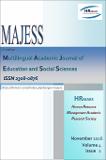The Role of Context in Interpretation of Political Utterances on Hate Speech in Kenya

View/
Publication Date
2016Author
IR Wangatiah, D Ongarora, P Matu
Metadata
Show full item recordAbstract/
This paper analyses the role of context in interpretation of political utterances on hate speech in
Kenya. The political landscape in Kenya has been characterised by multiparty politics since early
1980’s. When the Kenya African National Union (KANU) party won the 1992 general election
amidst stiff rivalry from other political parties, some of the political parties that lost the election
to KANU decided to merge into political coalitions so as to remove KANU from power. The end
result of this political scenario has been a heightened political rivalry between coalitions of
political parties. This rivalry is characterised by fierce exchange of political discourse with hardline ideologies resulting into a polarized Kenyan nation. This kind of political environment in Kenya
has culminated into events such as the infamous Post-Election Violence of 2007/2008. One of the
factors that have been widely speculated to account for the animosity amongst Kenyans is hate
speech perpetuated in political utterances. This paper analyses selected political utterances on
hate speech to demonstrate that politicians in Kenya heavily rely on context to encode hate
speech messages in their political utterances while making the utterance meaning obscure. The
paper attempts to show how context is therefore central to pragmatic interpretation of political
utterances on hate speech. In fulfilling these objectives, the paper applies principles advanced in
Relevance Theory by Dan Sperber and Deirdre Wilson (1985, 1996 & 2004) in the pragmatic
interpretation of political utterances on hate speech. Content analysis procedures were used in
the selection of relevant data from pre-election campaign speeches rendered during the 2013
General Elections in Kenya. The pre-election campaign speeches for the 2013 General Elections in
Kenya were retrieved from the archives of the leading media houses in Kenya; Kenya Television
Network (KTN), The Kenya Broadcasting Corporation (KBC) and The Royal Media Services
(CITIZEN). The paper argues that political utterances on hate speech in Kenya rely on the context surrounding the utterance to generate the possible intended hate speech message. It further
argues that politicians in Kenya are able to deny certain interpretations of meaning given to their
utterances on hate speech because the contexts surrounding such utterances obscure utterance
meaning by generating multiple pragmatic interpretations.
